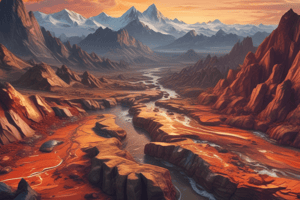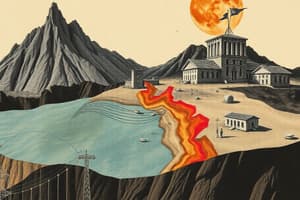Podcast
Questions and Answers
What are the causes of earthquakes?
What are the causes of earthquakes?
- Tectonic ground motions
- Volcanism
- Landslide
- All of the above (correct)
Volcanic earthquakes occur independently of any volcanic activity.
Volcanic earthquakes occur independently of any volcanic activity.
False (B)
What is earthquake engineering?
What is earthquake engineering?
The branch of civil engineering that provides principles and procedures for designing structures to resist earthquake effects.
Earthquakes are caused by the fracture and sliding of rock along ______.
Earthquakes are caused by the fracture and sliding of rock along ______.
Which of the following is NOT a seismic hazard?
Which of the following is NOT a seismic hazard?
According to the mechanism of generation, what type of earthquake is the most common?
According to the mechanism of generation, what type of earthquake is the most common?
Match the principles of earthquake engineering with their descriptions:
Match the principles of earthquake engineering with their descriptions:
Flashcards are hidden until you start studying
Study Notes
Earthquakes Overview
- Earthquakes are broad-banded vibratory ground motions resulting from various causes, including tectonics, volcanism, landslides, and man-made explosions.
- Naturally occurring tectonic earthquakes are the largest and most significant.
- Caused by the fracturing and sliding of rocks along faults within the Earth's crust, these faults can extend hundreds of kilometers in length and depth.
Types of Earthquakes
-
Volcanic Earthquakes
- Occur in conjunction with volcanic activity.
- Induced by magma movement, either injection or withdrawal.
-
Collapse Earthquakes
- Small earthquakes that occur in regions with underground caverns or mines.
- May be produced by massive land sliding.
-
Man-made Earthquakes
- Result from the explosion of chemical or nuclear devices.
Earthquake Hazards
- Seismic hazards can cause significant damage to the built environment, including:
- Fault rupture
- Vibratory ground motion
- Tsunamis
- Liquefaction
- Fire
Earthquake Causes and Mechanisms
- Modern theories explain the mechanisms behind earthquakes, highlighting:
- The relationship between geological features and earthquake-generating mechanisms.
- The phenomena influencing the mechanics of earthquake occurrence.
Earthquake Engineering
- A branch of civil engineering focused on designing structures that can withstand earthquakes.
- Principles include:
- Selecting appropriate locations for structures to minimize earthquake exposure.
- Estimating potential earthquake forces impacting structures over time.
- Analyzing structural response under seismic forces for maximum stress and deformation assessments.
- Designing structures that resist seismic stresses without collapse.
- Enhancing soil stability and natural slopes to support structures in vulnerable areas.
Historical Context
- The 19th century saw systematic studies on earthquake effects, with early research linked to tectonic processes.
- Kato's studies (Neodan, Japan, 1897) contributed to understanding faulting origins.
- Harry Fielding Reid proposed the Elastic Rebound Theory, which includes the concept of fault ruptures occurring at multiple depths.
Studying That Suits You
Use AI to generate personalized quizzes and flashcards to suit your learning preferences.




